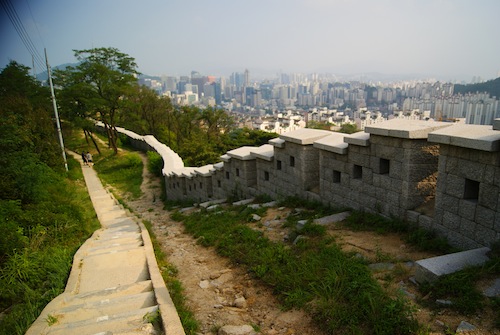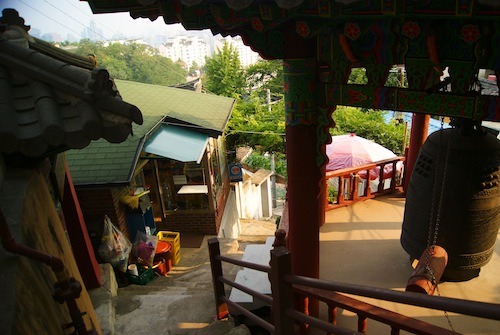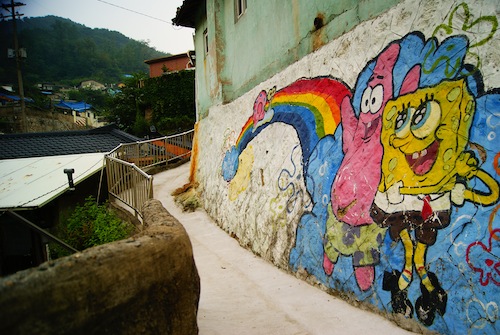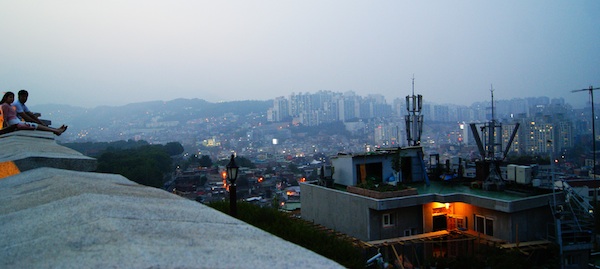344 messages over 43 pages: << Previous 1 2 3 4 5 6 7 ... 35 ... 42 43 Next >>
druckfehler
Triglot
Senior Member
Germany
Joined 4670 days ago
1181 posts - 1912 votes    
Speaks: German*, EnglishC2, Korean
Studies: Persian
| Message 273 of 344 21 August 2014 at 4:28pm | IP Logged |
2014년 8월 21일. Week 34.
Goldlists: 2
Podcasts: 37
Books: 6
-----
News Items: 10 (read) 14 (watched)
Written: 25
Conversations: 9 (in Germany) + immersion in Korea
Grammar Practice: 6
I arrived back home yesterday with a suitcase full of books, a lot of memories and a brain that already misses Korean. The switch to an English and later German environment was really weird and a little unpleasant. I got so used to living surrounded by Korean...
Today I just want to show off the treasures I brought home with me. I bought four novels, four non-fiction books and several textbooks for study. Apart from that, quite a few presents for friends and family - the presents I got for myself are all books :)

I got two novels about the Gwangju uprising, an important event in Korea's struggle for democracy in the 80s. I thought it would be nice to have some related books - might as well dig my way through the mountain of unknown vocabulary systematically. 기찻길 옆동네 seems the easiest read of all the books I bought, so I might start with it. 소년이 온다 is a more literary rendition and currently on the bestseller list in Korea.
안녕, 내 모든 것 is a novel I found while browsing the university bookstore. I've read the first chapter and it looks like a book I will enjoy. It's not too difficult to read either. That, along with interest, was my most important selection criterium. While my reading skills have improved quite a bit, books with more flowery or intellectual language would still be rather painful to read. The last novel in the bunch is 고래. I bought this with my leftover cash at the airport and I have no idea how difficult it is and what it's about exactly. We'll see.
In the nonfiction category I got one collection of short essays called 참 좋은 당신을 만났습니다. It's basically about diverse people who did some sort of good deed, usually small everyday things. This was also on the bestseller list - Koreans really seem to like that kind of sentimental essay. The reflections of the author are rather literary, so not all too easy to read, at least not without a dictionary. A similarly sentimental essay book is 1cm+. I already read the first volume on my trip through Korea. The 'essays' are even shorter, sometimes only a sentence or two. I bought this more because I like how cute and colourful it is than for study purposes, but volume one was actually quite helpful, even using a couple of 사자성어 (four-character sayings originating in Chinese), such as 청출어람 (靑出於藍, "the pupil surpasses his master") and 전생연분 (前生緣分, "a match made in heaven - literally a connection from another life").
Because I've been wanting to read the sort of thing anyway, I decided to also get two books from the psychology/human relationships section. 생각 버리기 연습 2 is written by a Japanese Buddhist monk who seems to be quite a popular author in Korea. I really like the Buddhist way of dealing with difficult thoughts and emotions, so I'm very curious what the book will be like. 나는 왜 감정에 서툴까? is a sort of psychological workbook for regulating one's feelings, complete with exercises to fill out. I'm looking forward to this both because it will probably be useful and because I want to see if there is anything particularly Korean about its take on emotions and human relationships. I particularly chose nonfiction to get used to non-literary writing in Korean and this should do the job as a first introduction.
This post has gotten quite long already, so I'll write about the textbooks next time. I have so much to tell from my time in Korea - so many new impressions, many things I learned in the Sogang program and on my own, I'll probably write a couple of long posts in the future.
Edited by druckfehler on 21 August 2014 at 4:48pm
4 persons have voted this message useful
| druckfehler
Triglot
Senior Member
Germany
Joined 4670 days ago
1181 posts - 1912 votes    
Speaks: German*, EnglishC2, Korean
Studies: Persian
| Message 274 of 344 24 August 2014 at 3:50pm | IP Logged |
2014년 8월 24일. Week 34.
Yesterday I went to the monthly German-Korean Meeting. Although I mostly speak German there (kind of sucks, but most of the Germans don't know much Korean and the Koreans prefer to talk to me in German as well...) people commented on how my Korean seems to have improved. And I think it really did, it was much easier to tune into the Korean conversations and I understood much more with more ease than I used to. It also felt very natural to join in and converse in Korean. I'm tempted to update Korean to "basic fleuncy" here, but I'm still much slower than a native, have to search for words and how I want to express things, probably make lots of mistakes I might or might not notice, etc. And newspaper vocabulary is mostly way over my head... Let's say I'll update Korean when I pass TOPIK level 6 for some added motivation for studying :)

Speaking of which, I bought quite a few textbooks in Korea. I quite liked the books Sogang uses. In class we did level 5A, so I decided to buy level 5B to work through on my own. There's a textbook with reading material and classroom activities/discussion questions, a small booklet explaining the new vocabulary and grammar in Korean and a workbook to practice new words and grammar with some fill-in or connecting exercises and some free writing questions.
While I still think the most important in advanced language learning is studying with native materials, supplementing that with some more structured study will probably be good for TOPIK. I especially look forward to the grammar practice.
I also got two writing books by Sogang, because they looked very interesting and might be a better preparation than the TOPIK writing section practice books. It's a series designed for exchange students, so 쓰기 1 and 2 mostly teach how to sign up for courses, handle administrative stuff and survive on campus. 쓰기 3 and 4 focus on academic writing (and reading and listening to lectures) on different topics, which is exactly what I'd like to learn.
I also bought 3 books out of a series of 6 Chinese textbooks in Korean and a book explaining Chinese grammar. There's no way back now - I'll have to study Chinese in the future :) Although I don't know when I'll start yet, I've been thinking about learning Chinese through Korean and I'm excited to have had the opportunity to buy affordable textbooks. It's so ridiculous that in Germany I might pay 40 Euros for a textbook that costs a little over 10 Euros in Korea… It was really hard not to empty the whole bookstore :D
Edited by druckfehler on 24 August 2014 at 4:01pm
4 persons have voted this message useful
| Evita
Tetraglot
Senior Member
Latvia
learnlatvian.info
Joined 6354 days ago
734 posts - 1036 votes    
Speaks: Latvian*, English, German, Russian
Studies: Korean, Finnish
| Message 275 of 344 25 August 2014 at 12:20pm | IP Logged |
It sounds like you had a great time. And so many books! I'd probably also buy them if I had the chance, the cost of ordering books from Korea is huge.
Whenever I read your log, I think about how much I still have to study to get any good at Korean. It's usually quite motivating :)
1 person has voted this message useful
| druckfehler
Triglot
Senior Member
Germany
Joined 4670 days ago
1181 posts - 1912 votes    
Speaks: German*, EnglishC2, Korean
Studies: Persian
| Message 276 of 344 26 August 2014 at 11:23am | IP Logged |
Evita wrote:
| Whenever I read your log, I think about how much I still have to study to get any good at Korean. It's usually quite motivating :) |
|
|
I still get that feeling all the time. Especially when reading job descriptions looking for fluent Korean or when trying to read newspaper articles. Some of the books I bought also make me feel like I just don't know enough yet. But, well, I'll probably still feel that way for a long, long time to come because there's always something to improve. Der Weg ist das Ziel... ;)
1 person has voted this message useful
| tarvos
Super Polyglot
Winner TAC 2012
Senior Member
China
likeapolyglot.wordpr
Joined 4509 days ago
5310 posts - 9399 votes    
Speaks: Dutch*, English, Swedish, French, Russian, German, Italian, Norwegian, Mandarin, Romanian, Afrikaans
Studies: Greek, Modern Hebrew, Spanish, Portuguese, Czech, Korean, Esperanto, Finnish
| Message 277 of 344 26 August 2014 at 1:53pm | IP Logged |
Wow, sounds like you had an amazing time in Korea? And if everything's so cheap there, I
have to get to Korea at some point and stock up! I'm so envious of you!
Sadly my Korean isn't that great, but at least I wrote a message in Korean the other day
and it got across :)
1 person has voted this message useful
| druckfehler
Triglot
Senior Member
Germany
Joined 4670 days ago
1181 posts - 1912 votes    
Speaks: German*, EnglishC2, Korean
Studies: Persian
| Message 278 of 344 17 September 2014 at 4:13pm | IP Logged |
tarvos wrote:
Wow, sounds like you had an amazing time in Korea?
Sadly my Korean isn't that great, but at least I wrote a message in Korean the other day and it got across :) |
|
|
Definitely, I had a blast. Although there were also times when I wondered why I like Korea so much :D It's good to see you're still doing stuff with Korean. Your multilingual blog is amazing, I hope you'll write a Korean text one day ;)
2014년 9월 17일. Week 38.
Goldlists: 2
Podcasts: 40
Books: 6
-----
News Items: 10 (read) 14 (watched)
Written: 27
Conversations: 14 (in Germany) + immersion in Korea
Grammar Practice: 6
The immersion effect seems to have worn off after about 2 weeks. While I have been studying and reading, Korean is no longer completely activated as my primary language (or one of my primary languages?). I got a second language exchange partner and met with him twice so far. The second time was painful... I forgot the easiest words and felt stupid. There must be a psychological component to it - while I might make the same mistakes, I find it a lot easier to talk to the language exchange partner I've been meeting with since last year. But most of all it tells me that I need more active practice.
I've started working through three of the books I bought in Korea. I'm reading the novel 기찻길 옆동네 and it's very suitable for my current level. I look up all unknown words, but can still read 10-15 pages per hour. My overall count of books read in Korean is at 20 now and I find that a lot of words are no longer complete unknowns. I may not know the exact definition (so I look it up), but even without a dictionary I understand them well enough in context to know what's going on and have some sense of the feeling they convey. 기찻길 옆동네 is definitely an easy novel describing a fairly small world with lots of dialogue and concrete language. The author also has a curious habit of using a word again very soon after its first introduction (something I wouldn't even notice in a German or English book). Nevertheless it feels great to be able to read it that well.
The psychology book I bought about emotional regulation is great. I've only started on it, but it's exactly the kind of factual, argumentative style of Korean I needed a role-model for. I think this will help me a lot in learning how to write TOPIK-worthy essays. First I actually need to read through it, but later I might work with it more closely, extracting useful sentence patterns and argumentative structures.
I also started using 서강 쓰기 3. It's supposed to be suited to students who have completed the level 4 textbooks, so it seems like a good fit and it's very helpful already. The preliminary chapter introduces Korean grammar from a slightly different standpoint than I'm used to. Instead of introducing specific patterns, it gives an overview of the types of sentences which exist in Korean. It also introduces the terms for syntactic functions and teaches how to build complex sentences using noun clauses, adnominal clauses, adverbial clauses, predicate clauses as well as direct and indirect speech. It's very useful to get such a structural overview of how Korean works - I knew a lot of it already intuitively, but learning about it formally strengthens that knowledge. I'm now working on chapter one, which introduces native texts and lectures about the Korean language. The 서강 쓰기 books look very good for acquiring vocabulary and useful grammar patterns. Chapter 1 Part 1 introduces 3 sentence patterns for contrasting, for example:
동생은 키가 크나 언니는 키가 작다.
동생은 키가 큰 데 반해 언니는 키가 작다.
동생은 키가 큰 반면에 언니는 키가 작다.
키가 큰 동생과는 달리 언니는 키가 작다.
Those grammar patterns by function are maybe the most useful part of the books. But there are also lots of writing, lecture note taking and vocabulary exercises, as well as explanations how to structure essays.
ُ
2 persons have voted this message useful
| druckfehler
Triglot
Senior Member
Germany
Joined 4670 days ago
1181 posts - 1912 votes    
Speaks: German*, EnglishC2, Korean
Studies: Persian
| Message 279 of 344 30 September 2014 at 2:23pm | IP Logged |
2014년 9월 30일. Week 40.
Goldlists: 2
Podcasts: 42
Books: 7
-----
News Items: 11 (read) 14 (watched)
Written: 30
Conversations: 15 (in Germany) + immersion in Korea
Grammar Practice: 6
I finished my 7th book of the year! All 422 pages of 기찻길 옆동네. It got pretty tragic in the end... Well, you could say that the whole plot was a series of big and small catastrophes. I quite liked it, though. It described a whole series of characters, weaving in and out of their lives as they came into contact with a couple of central child protagonists. While all of them were painted as individuals, the novel as a whole described the inhabitants of two neighbourhoods, both of them 달동네 (Moon Villages - the basic, inofficial settlements of the poor, usually built on slopes left out of city development, where the moon is more visible. The favelas of South Korea, so to speak). In the last part, it also describes the Gwangju Uprising and massacre and how it touches, changes, and - in some cases - takes the lives of the people introduced throughout the book.
While I was in Seoul, I got very interested in the city's mountains and hills, because they often seemed to be places where time had stood still, where an older Seoul could still be experienced. Sometimes shack-like small houses instead of high-rise apartment blocks, corner shops instead of chain-stores like GS25, maybe a a temple, maybe a sacred tree.
Once I basically just looked at daum maps and chose a random hiking track. Something I wish I had done more often. While a lot of hiking tracks in Korea are constructed with wooden stairs and whatnot, I ended up following a faint path full of obstacles (they were building a wooden walkway on one part of it :D)

I hiked up Inwangsan, on the slopes of which I found several old neighbourhoods. Inwangsan is one of the mountains framing central Seoul. You can walk along its ridge, next to parts of the old city wall. You get a good view of the palace Gyeongbukgung, Namsan tower and the many dull apartment blocks of Seoul. If the smog lifts, you can see all the way to Gangnam (I got a faint view of 63 Building, the highest building in Seoul).

I walked down a small path, through a stretch of wilderness, because I wanted to get to the next subway station. A good choice. I discovered a quiet neighbourhood with several buddhist buildings and a group of shamanist(?) worshipers offering soju and makgolli to an old tree. The concrete stairs leading down the mountain were framed with beautiful murals, showing tigers and sea gods.

On another day I went to 개미마을 (Ant Village), one of the last remaining Moon Villages in Seoul. It got its nickname thanks to its poor but diligent inhabitants. The village is just another neighbourhood of Seoul, but as it's situated on the slope of the mountain you might not think you're in a metropolis. Seoul is full of green spots - some carefully tended parks, some mountainous wildernesses - something I particularly like about the city.

To get there I took a small bus filled with ancient grandmothers, slowly winding its way up the mountain. The residents are used to nosy photographers. The neighbourhood got quite some attention for a project that had art students cover its walls with murals. The murals are cute and funny and worth seeing. It's also a reminder of Korea's rapid economic rise - exhibiting the sights and smells of a much poorer past.
Hiking up the hills and mountains of Seoul is what I would most recommend to a visitor. There's a hiking route taking you all along the old city wall, which seems very recommendable. I only hiked two small parts of it, but fell in love with it. Here's another photo, taken from Naksan:

Edited by druckfehler on 30 September 2014 at 2:44pm
2 persons have voted this message useful
| Evita
Tetraglot
Senior Member
Latvia
learnlatvian.info
Joined 6354 days ago
734 posts - 1036 votes    
Speaks: Latvian*, English, German, Russian
Studies: Korean, Finnish
| Message 280 of 344 30 September 2014 at 4:00pm | IP Logged |
Thanks for the write-up, I'll definitely check out some of the hiking trails when I go there. We have a saying in Latvian "to go where your nose points", which means basically that you are free to choose any direction. It's my favorite way to explore new places.
1 person has voted this message useful
|
You cannot post new topics in this forum - You cannot reply to topics in this forum - You cannot delete your posts in this forum
You cannot edit your posts in this forum - You cannot create polls in this forum - You cannot vote in polls in this forum
This page was generated in 0.5313 seconds.
DHTML Menu By Milonic JavaScript
|













